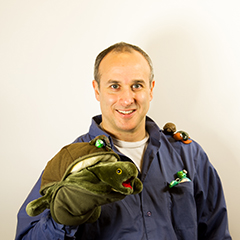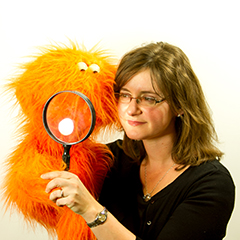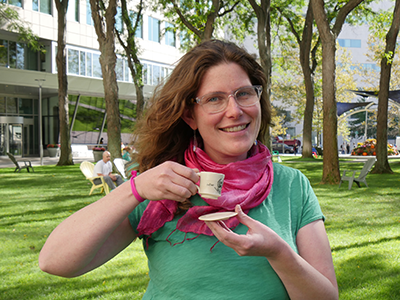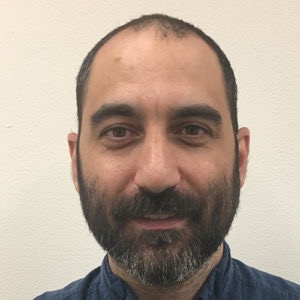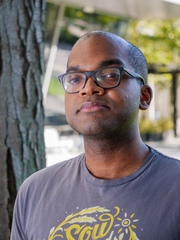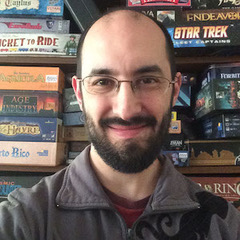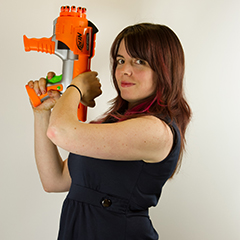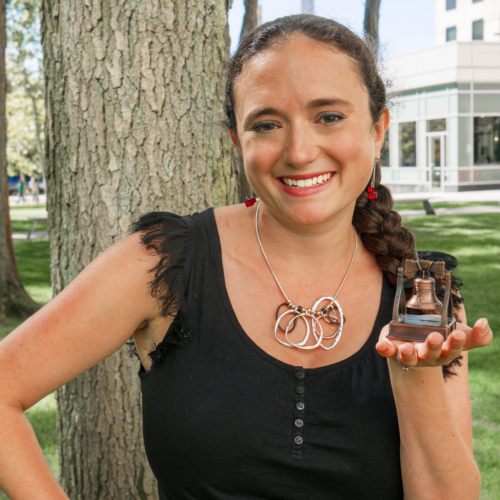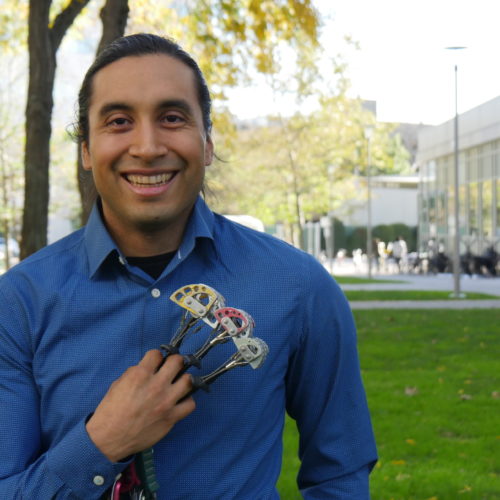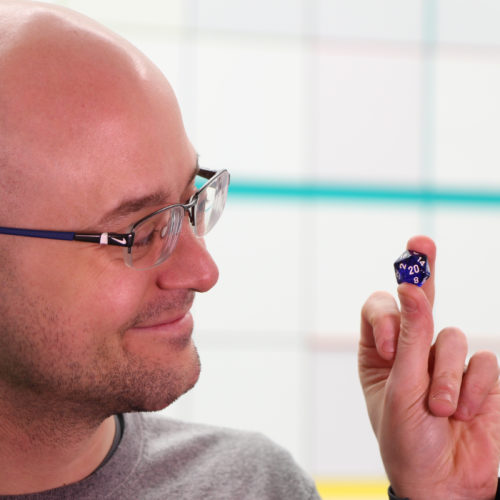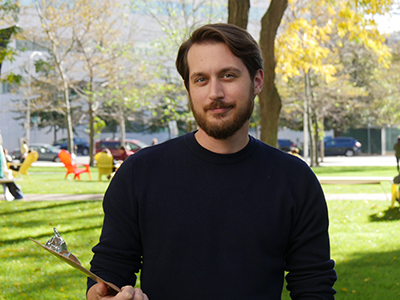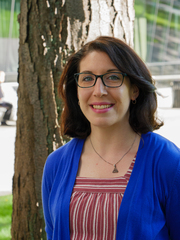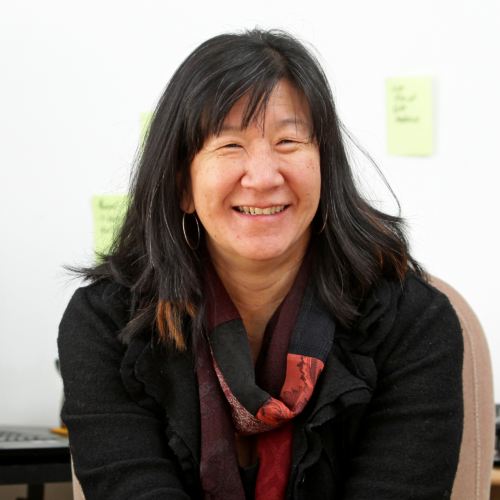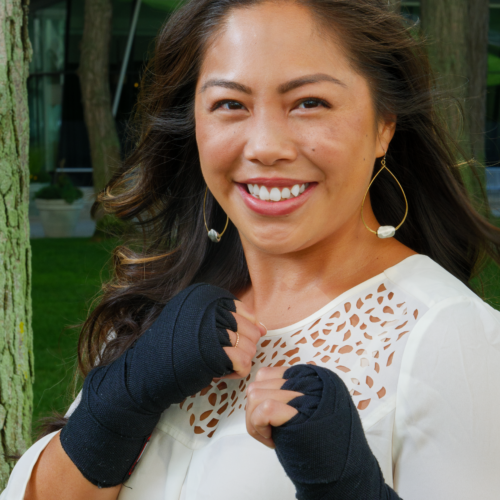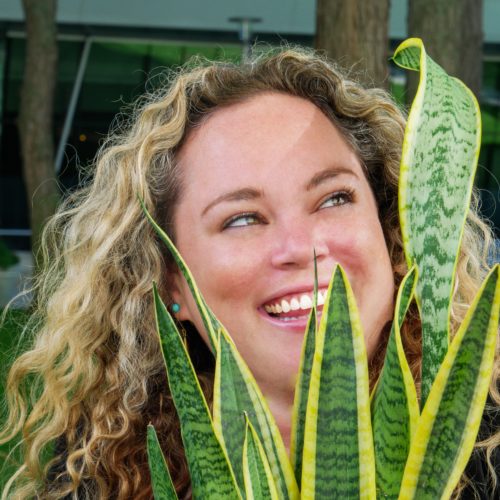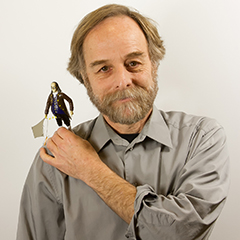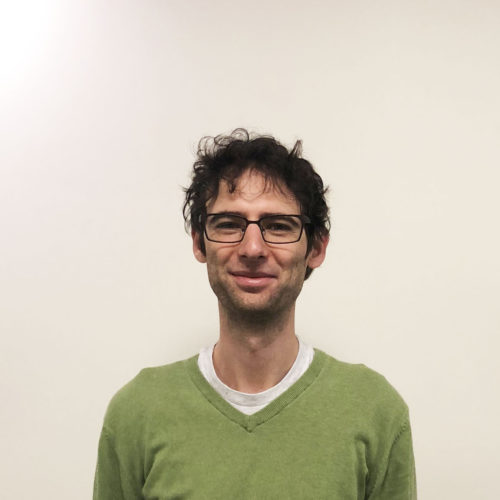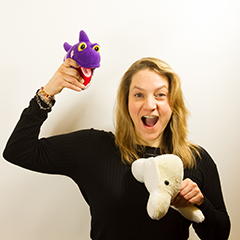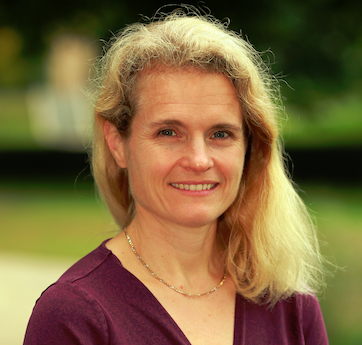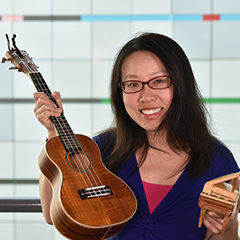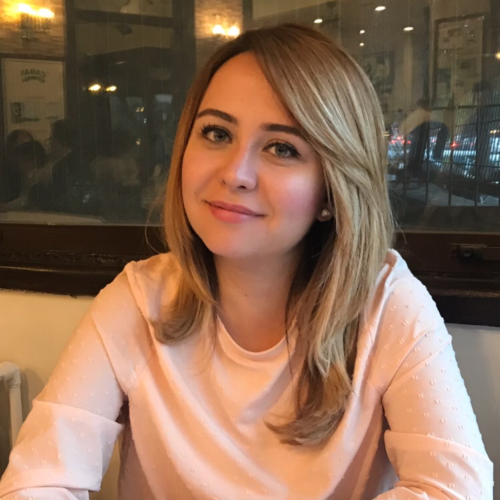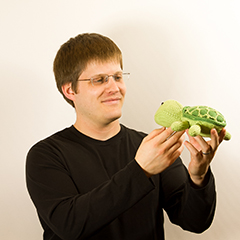Our Team
The team behind STEP and TEA
Eric Klopfer
Eric Klopfer is Professor and Director of the Scheller Teacher Education Program and The Education Arcade at MIT (link to CV). He is the Head of the department of Comparative Media Studies and Writing. He is also a co-faculty advisor for MIT’s J-WEL World Education Lab. His work uses a Design Based Research methodology to span the educational technology ecosystem, from design and development of new technologies to professional development and implementation. Much of Klopfer’s research has focused on computer games and simulations for building understanding of science, technology, engineering and mathematics. He is the co-author of the books, “Adventures in Modeling”, “The More We Know, and the recently released “Resonant Games”, as well as author of “Augmented Learning.” His lab has produced software (from casual mobile games to the MMO The Radix Endeavor) and platforms (including StarLogo Nova and Taleblazer) used by millions of people, as well as online courses that have reached hundreds of thousands. His work has been funded by federal agencies including NIH, NSF and the Department of Education, as well as the Gates Foundation, the Hewlett Foundation, and the Tata Trusts. Klopfer is also the co-founder and past President of the non-profit Learning Games Network (www.learninggamesnetwork.org).
Quote:“Over the years I've collected many turtles, the iconic figure from the Logo language lineage dating back to Seymour Papert. I grew up in the age of Logo and was inspired to learn programming at an early age. The turtle continued on in Mitch Resnick’s work, and we maintain turtles at the heart of StarLogo.”
Judy Perry
Judy Perry is Director of STEP/TEA, overseeing design, development, and research across the lab’s projects. Prior to serving as Director, Perry spent 15+ years in STEP as a Research Manager where her research focused on mobile and AR/VR educational games, simulations, and toolkits, and their integration into formal and informal learning settings. Her work included the TaleBlazer augmented reality (AR) software platform, CLEVR (Collaborative Learning Environments in Virtual Reality), pSims (mobile participatory simulations), and CLIx (the Connected Learning Initiative). Prior to joining MIT’s STEP lab, Perry’s work included television and web production, and content development for educational toys. Perry holds a BA in American Studies from Yale University and an EdM in Technology, Innovation, and Education from the Harvard Graduate School of Education.
Quote:Judy agrees with Seymour Papert that the best learning is “hard fun.” The effort of searching for elusive clues, pondering evidence, solving a mystery—it's fun precisely because it is challenging.
Emma Anderson
Emma Anderson has a PhD from the University of Pennsylvania’s Graduate School of Education. She holds an MA from the University of Buffalo in geology and an BA from Smith College in sociology-anthropology. Her research centers around science, art, making, and play. Prior to her doctoral studies, she worked at Baltimore Woods Nature Center as an environmental educator bringing science lessons into urban kindergarten through 6th-grade classrooms and leading summer campers around the woods.
Matthew Berland
Matthew Berland is an Associate Professor of Design, Creative, and Informal Education in the Department of Curriculum and Instruction at UW–Madison and Affiliate Faculty in Information Studies, Computer Sciences, Educational Psychology, and Science/Technology Studies. He uses design-based research to create and analyze tools and learning environments that support students’ creative agency and computational literacies. His projects are designed to better understand how students learn complex skills and understandings through mixed methods including learning analytics, data mining, and constructionist design research. Berland holds a Ph.D. from Northwestern University, and he is the director of both the Complex Play Lab and the UW Game Design Program.
Jon Bowman
Jon joins the STEP Lab as a Software developer, creating educational games and experiences and contributing to the TaleBlazer platform. Previously, Jon has worked on everything from Nickelodeon web games to enterprise SaaS applications. He has a degree in Game Design and Development from Rochester Institute of Technology. He loves to talk about games, especially obscure and terrible ones.
Ira Fay
Ira Fay is also an Associate Professor of Computer Science and Game Design at Hampshire College and the CEO of Fay Games, a studio primarily focused on games for educational impact. Prior to his academic career, Ira was a Senior Game Designer at Electronic Arts (Pogo.com), and before that, he worked at Z-Axis (Activision) on X-Men 3, Maxis on The Sims 2, and Walt Disney Imagineering on ToonTown Online. Ira graduated from Carnegie Mellon University with a bachelor’s degree in computer science and master’s degrees in information systems management and entertainment technology. He is also a published puzzle designer and board game designer, including co-designing expansions for Agricola and Xia: Legends of a Drift System.
Caitlin Feeley
Feeley designs and researches educational games and related technologies. Her areas of interest include participatory narratives, museums, STEM topics, and financial education. She was the project manager and co-designer for Vanished, a transmedia science mystery game/event co-developed with the Smithsonian, which reached more than 6,500 players. Past projects have included multimedia instructional materials for the National Science Foundation-funded Kids Survey Network, a program teaching statistics and data analysis to middle schoolers. She also co-designed the award-winning financial literacy games Farm Blitz and Bite Club for the Doorway to Dreams Fund. Feeley was the 2016 Fellow in Museum Practice at the Smithsonian Center for Learning and Digital Access, and holds a master’s degree in Technology, Innovation and Education from Harvard University.
Fun Fact:Caitlin got her start in game development through live action role-playing games, and still makes time on weekends to chase down zombies with NERF guns like this one. Her gun reminds her that that a great game should engage us physically, emotionally, and intellectually. It also reminds her to always be prepared for zombies.
Jenny Gardony
Jenny is excited to be the Program Manager at the Scheller Teacher Education Program. Prior to coming to MIT, Jenny taught in the Boston area for 10 years; in Cambridge Public Schools, Boston, and at the Community Charter School of Cambridge. There, Jenny served as a mentor for new teachers, a grade level leader, drama club founder, and even hosted a student teacher from STEP! Jenny earned her B.A. in Developmental Psychology from Tufts and her M.Ed. in Math Education from Cambridge College. Outside of work, Jenny loves baking, long walks with her dog, and spending time with her family.
Daniel Green
Green manages sponsored research administration and financials for the Scheller Teacher Education Program and The Education Arcade. Green has a passion for climbing and is often pondering where to travel next. As a mentor for climbers through the MIT Outing Club, he has developed a special interest in teaching climbing—sometimes for unusual circumstances. He travels to climbing destinations around the world, and also enjoys puzzles.
Quote:“It's important to use proper protection while climbing. Looking good is equally important.”
Brandon Hanks
Hanks is the lead developer on the Connected Learning Initiative. His development efforts focus on educational games and the technology to deliver them. Prior to joining MIT, he built and managed development teams for a variety of start-ups, ranging from Android development to remote sensing. Hanks has bachelor’s degrees in math and physics, with a minor in chemistry.
Quote:“Numbers and imagination come together in Brandon's favorite game: Dungeons & Dragons. Currently, he's playing the fifth edition as a swashbuckling rogue.”
Alex Hargroder
Hargroder came to MIT after ten years in public education as a high school English teacher, instructional coach, and assistant principal in Louisiana and Texas. He is a Teach For America alumnus and has experience developing curricula, training and coaching teachers, and has recently worked on projects involving wrap-around student support, trauma-sensitive and restorative practices, project-based learning, career-technical education, and community partnerships. His current interests are related primarily to issues of equity and creating transformational learning experiences for students and teachers. He holds a BA in English from Louisiana State University and an MEd in educational leadership from the University of Texas at Arlington.
Quote:“As a teacher, I never felt complete without my clipboard. Document holder, fan, sun shield, acting prop, door stop—truly a tool for every occasion.”
Avneet Hira
Avneet Hira’s work is motivated by the role technology and space can play in creating equitable learning experiences. Her research so far has been on formal and informal learning in Makerspaces, broadening participation in engineering learning at the K-12 level, and employing reflective practice as a tool for student-centered learning. She has conducted professional development workshops for middle and high school teachers and university educators on topics including educational Makerspaces and technology, design and engineering pedagogies, and culturally relevant design and teaching practices. During her time as a graduate student, she was the President of the Student Platform for Engineering Education Development (SPEED), an international non-profit with members from over 15 countries with a shared mission to affect change in their education. She received a Ph.D. in Engineering Education and an M.S. in Aerospace Engineering from Purdue University, and a B.E. in Aeronautical Engineering from Punjab Engineering College.
Colleen Desrosiers Laude
Colleen joins the STEP lab as the Administrative Assistant, her responsibilities are to supervise equipment inventory, organize lab events, and manage the Director’s calendar. Prior to joining MIT she spent over nine years working at Harvard University. She holds a B.A. in English and Theater from Goucher College and earned a Professional Graduate Certificate in Learning Design and Technology through the Harvard Extension School in 2018.
Irene A. Lee
Irene Lee is a research scientist at the Scheller Teacher Education Program and The Education Arcade. She is the founder and program director of Project GUTS: Growing Up Thinking Scientifically and Teachers with GUTS. The programs she develops enable participants to create computer models and use them to gain a scientific understanding of the world around them. Lee’s research focuses on students’ and teachers’ understanding of complex adaptive systems and their development of computational thinking skills. She served as the chair of the Computer Science Teachers Association (CSTA) Computational Thinking Task Force and as a lead writer of the K-12 Computer Science Frameworks and the CSTA K-12 Computer Science Standards (of 2011). Lee is a past president of the Supercomputing Challenge and the Swarm Development Group, and was previously the director of the Learning Lab at Santa Fe Institute.
Quote:“I have had a lifelong fascination with natural forms—their use of space and patterns of growth. As a child, I drew trees based on branching rules and loved to generate ripple patterns based on interference. In the early days of computer graphics, I saw the potential of computers as tools to understand and mimic the natural world through animation and simulation, and thus began a long quest to understand patterns in nature through modeling and simulation.”
Alice Liao
Alice joins the MIT Scheller Teacher Education Program as the XQ Project Based Learning Coach and Designer. She comes from spending 10 years in and out of the classroom in public education as a high school history teacher in Wellesley, MA. Her career has focused on leading anti-racist training as well as public speaking workshops for young leaders. She is passionate about fighting for our youth–to empower our youth to be effective citizens of our world. In doing so, she has spent her last two years in public education centralized on creating and designing a project-based learning program at Wellesley High. Alice holds a B.A. in History from Simmons University, an M.A.T. in Secondary Education from Simmons University and a Masters in Public Administration and Policy from American University.
Mary McCrossan
Mary joins the STEP lab as Events Coordinator and Program Manager for The Science and Engineering Program for Teachers. Mary’s responsibilities are to coordinate and plan PD events throughout the year including handling the logistics, budgets, negotiating contracts and leading communications on behalf of STEP. Mary started her professional career at The Berkman Klein Center for Internet and Society’s Youth and Media team at Harvard Law School as the digital producer and then moved to the Marketing and Events assistant at the Life Science company Abcam.
Scot Osterweil
Osterweil is the creative director of The Education Arcade and a research director in the MIT Comparative Media Studies/Writing Program. As a game designer he has worked in both academic and commercial environments, and his work focuses on the authentically playful aspects of challenging academic subjects. He has designed games for computers, handheld devices, and multiplayer online environments. He is the co-creator of the acclaimed Zoombinis series of math and logic games and has lead a number of projects in The Education Arcade, including the MIT/Smithsonian-curated game, Vanished (environmental science); Labyrinth (math); Kids Survey Network (data and statistics); Caduceus (medical science); iCue (history and civics); and the Hewlett Foundation’s Open Language Learning Initiative (ESL). He is a founding member of the Learning Games Network, where among other projects he created Quandary (ethics), the 2013 Games 4 Change Festival game of the year.
Quote:“Ben Franklin was the greatest mind of the 18th century, a self-taught scientist and statesman. He represents nothing if not playfulness, curiosity and the power of self-directed learning.”
Dan Roy
Dan Roy is a research scientist at the Education Arcade and the Teaching Systems Lab, designing playful learning experiences for teachers and students alike. He is the lead game designer on the CLEVR project, inviting high school biology students to explore a cell in VR and collaboratively diagnose and treat a genetic disorder. He directs the ELK project, helping teacher candidates practice understanding what students know through roleplay conversations. Dan is also the founder of Skylight Games, a social enterprise inspiring a love of learning through play, starting with languages (Lyriko). Before his current roles, he worked with the Learning Games Network on games to teach language (Xenos) and science (Food Fight, Guts and Bolts), and with the Education Arcade, helping middle-schoolers build curiosity, intuition, and comfort in math through puzzles (Lure of The Labyrinth). He has an SM in Comparative media studies from MIT and a BS in computer science from UMass Amherst.
Ilana Schoenfeld
Schoenfeld is a content strategist and producer with a passion for researching, designing, and developing educational experiences at the intersection of digital and physical spaces. She is particularly interested in translating science to story (via various media) to bring abstract concepts to life for diverse audiences. Over the course of her career, she has worked as an education researcher, executive science editor, distance-learning program evaluator, and museum exhibit developer. Schoenfeld holds a master’s in environmental science/social ecology from Yale University and a BA in Latin American history from Brandeis University.
Photo description:Ilana believes inspiring wonder is a powerful way to engage students in learning. She is often amazed by interconnections and patterns she sees in nature. These stuffed whale-fish represent agents in a much larger stuffed-fish ecosystem.
Meredith Thompson
Thompson draws upon her background in science education and outreach as a research scientist and lecturer for the Scheller Teacher Education Program. Her research interests are in collaborative learning, STEM educational games, and using virtual and simulated environments for learning STEM topics. She has a bachelor’s degree in chemistry from Cornell, a master’s in science and engineering education from Tufts, and a doctorate in science education from Boston University. She has two current projects: the Collaborative Learning Environments for Virtual Reality (CLEVR) is creating a cross platform collaborative game about cellular biology, and INSPIRE is a group of education professors who are using games and simulations in teacher preparation. Thompson uses those games and simulations when she teaches the STEP course: “Understanding and Evaluating Education.”
Interests:In her spare time, Meredith writes and sings music with her twin sister Chris (www.cmthompson.com), writes poetry, and enjoys hiking in the woods.
Angie Tung
Tung joined the lab with years of product management in public broadcasting followed by a brief stint in the corporate web production world. Early exposure to Tetris and Dr. Mario taught her the joys of putting things in proper order and that the completion of neat packages can efficiently shorten a task list. Games like Dungeons & Dragons taught her to look outside those proverbial neat boxes for creative solutions to tricky puzzles, including complex projects with multi-layered dependencies. On a daily basis she helps to take care of tasks related to: development processes, contracts, budgets, schedules, scope, vendor relationships, billing, and other planning duties for her projects and also for The Education Arcade’s lab. Tung holds a BA in music from Florida State University and an MA in media arts from Emerson College.
Quote:I'm forever inspired by music for its intricacies when shaped into masterful compositions, its fluidity while improvised, and its capacity to communicate universally. When not making music, I am an equal opportunity eater, hula hoop dancer, and bicycle enthusiast, sometimes all at the same time.
Cigdem Uz Bilgin
Cigdem Uz Bilgin holds a master’s in Computer Education and Instructional Technology from Hacettepe University and a doctorate in Computer Education and Instructional Technology from Middle East Technical University. Her research focuses on using virtual environments and games for playful experiences for teachers and students. Cigdem is a research assistant at Yildiz Technical University and she is currently working as a researcher for Collaborative Learning Environments for Virtual Reality (CLEVR) project and Reach Every Reader project in the Education Arcade/Scheller Teacher Education Program at MIT. CLEVR is developing an educational game using immersive VR to help students learn cell biology and Reach Every Reader aims to create support systems to strengthen the early literacy skills of children.
Daniel Wendel
After taking several Scheller Teacher Education Program classes as an MIT undergraduate, Wendel officially joined STEP as a Master of Engineering student under Professor Klopfer’s supervision in 2005, taking on the task of rewriting StarLogo TNG’s terrain system and much of its 3D rendering system. After graduation and a brief stint as a systems engineer in the defense industry, Wendel returned to STEP as a staff member to help lead the then-newly-formed Imagination Toolbox project, which aims to increase student interest and ability in STEM subjects through the use of computer tools like StarLogo TNG. Wendel continues to work as a software developer, curriculum designer, and research manager for several projects in STEP and The Education Arcade, and also takes his role as a student supervisor and mentor seriously. He’s worked closely with more than 40 Undergraduate Research Opportunities Program (UROP) and MEng students who’ve contributed in countless ways to STEP and The Education Arcade.
Photo description:The Turtle is the central actor of Logo, a pioneering computer language that gave elementary school students the opportunity to become computer programmers. This particular turtle, though, is a handmade gift from Daniel's wife, who is a better programmer than he is.
